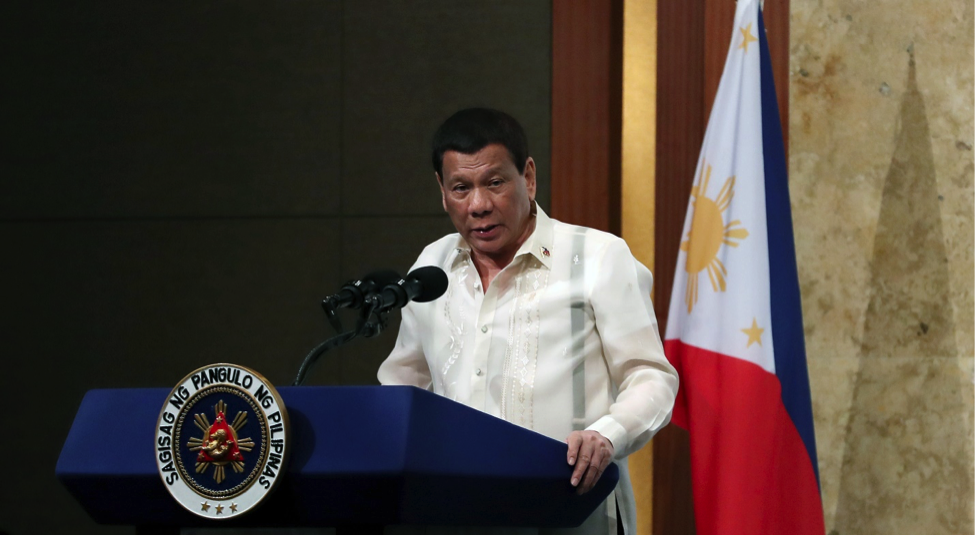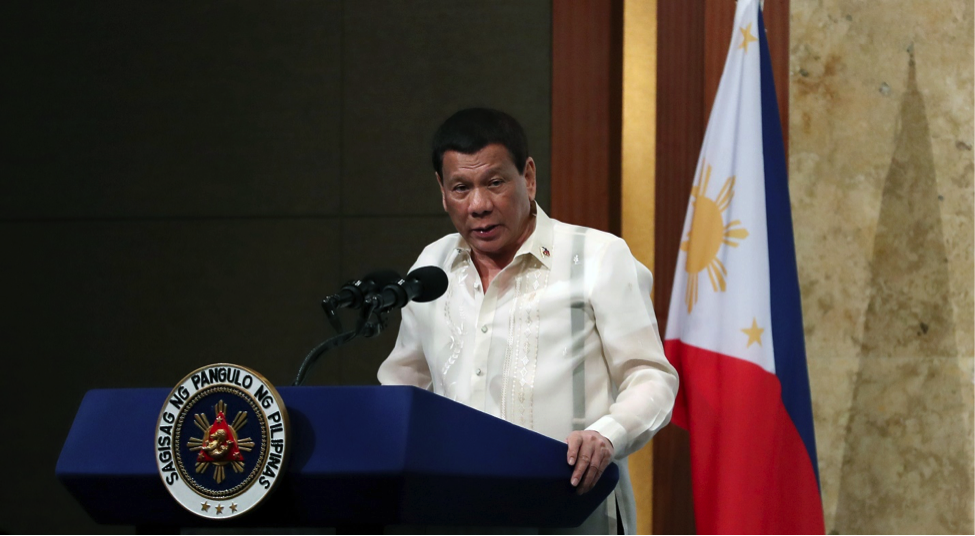Highlights:
- Man of the Year in organized crime and corruption
- New research indicates a digital divide based on age, wealth, gender
- Unintended consequences of data and storytelling
- Translating transparency to accountability
- New agreement launched to enhance fiscal transparency in LAC
- MEL and adaptive management
In case you missed it…

Photo: Jeon Han
2017 Man of the Year in organized crime and corruption
We start this issue with the 2017 Man of the Year in organized crime and corruption – Philippines President Rodrigo Duterte, who beat South Africa’s Jacob Zuma and Zimbabwe’s Robert Mugabe. While Duterte remains in power, kleptocrats in some parts of the region have not gone scot-free. Pakistan’s former Prime Minister Nawaz Sharif has been sentenced to 10 years in jail over corruption charges. The Malaysian government has frozen 408 bank accounts allegedly linked to the multi-billion dollar scandal at state fund 1MDB, implicating ousted Prime Minister Najib Razak. LAO PDR has been ranked as one of ASEAN’s most corrupt states, despite Prime Minister Thongloun Sisoulith’s focus on anti-graft measures when he took office in 2016.
Over in Mexico, newly elected President Andres Manuel Lopez Obrador vows to end corruption during his term, though some critics aren’t convinced (see also Implementation of the Anti-corruption Open Up Guide in Mexico). The Organized Crime and Corruption Reporting Project (OCCRP) breaks down why Switzerland’s anti-corruption measures fall short. Matt Kell explains why corruption risks in the oil and gas industry are high. But what is the economic cost of corruption? Vanessa Malila explains in the Kenyan context.
New research indicates a digital divide based on age, wealth, gender
Overall usage of the internet, smartphones and social media have gone up, but research by the Pew Research Center indicates disparities based on age, education, wealth and gender. Would stricter internet laws widen these gaps? What would it mean for civic participation? In Tanzania for instance, the $930 blogging fee imposed by the government is forcing young and often poor content creators offline. In Uganda, the social media tax is pushing connectivity further out of reach of millions of low-income citizens. Both governments justify these moves as efforts to combat misinformation. While social media platforms are indeed not infallible, Tarleton Gillespie proposes that tech companies should be socially responsible by improving content moderation. In the EU, will the proposed internet copyright reform threaten free speech (take note – Wikipedia shut itself down in protest)? Karlin Lillington breaks down the potential negative consequences of Articles 11 and 13. The bill has been rejected by the European Union but will be back on the drawing board in September.
Unintended consequences of data and storytelling
Tanzania’s leading newspaper rolled out the country’s first ever data-driven news platform. According to journalist Nuzulack Dausen, “data journalism strengthens the media’s credibility, as our stories are now backed by statistics.” Danusen is optimistic about using digital storytelling to drive real change – for example by breaking biases and building equity, as explained by Carrie Fox. Sujatha Fernandes, however, asks – “are stories really the magical elixir we imagine them to be?” The author argues curated storytelling runs the risk of disguising deeper forms of oppression. This resonates with Kim Lyon’s point on the need to contextualize and even disaggregate data to avoid unintended consequences.
Translating transparency to accountability
What would it take for transparency to result in action? Evidence translators, accessibility, and civil society collaboration, according to our weekly scan. It’s always great to see efforts to open up data around the world. India’s Directorate of Economics and Statistics will be implementing a World Bank-funded scheme to strengthen statistical capacity and infrastructure for handling information. The European Commission proposes data sharing across economic sectors to increase the EU’s competitiveness in the new data economy. But good evidence is not enough to encourage policymakers to use that evidence. According to the Results for Development team, politically savvy “evidence translators” play a key role in packaging and delivering data in a way that impacts decision-making. Same goes for Africa. Michael Castro reports that while the number of African countries producing citizen’s budgets is increasing, this has not translated into accessibility. And in Europe, the International Budget Partnership highlights the need for a network of civil society organizations focused on holding governments accountable for public budgeting practices.
New agreement launched to enhance fiscal transparency in LAC
In an effort to curb corruption and boost economic development in Latin America and the Caribbean, the World Bank Group and the Organization of American States launched the Panama Agreement, which includes enhancing fiscal transparency and multi-stakeholder cooperation for accountability. Though multi-stakeholder collaborations are not that easy, Richard Crespin and Helen Moser share six principles for high-functioning multi-stakeholder partnerships.
Something for funders and organizations working in the tax justice space – ODI provides a broad sweep of literature on reforming tax systems in the developing world. International development efforts to support fiscal reform have surely evolved, can the same be said of national efforts to curb illicit financial flows. Speaking of, the UK has hit the ground running with 839 cases of offshore wealth opened for investigation over the past year. A new report found 30% of public sector pension funds in Scotland were invested in firms based in tax havens. Denmark’s largest bank has been found to have laundered €7bn of Russian “blood money”. The US has built its reputation as a big tax haven, but perhaps all hope is not lost. Casey Michel explores how the Geographic Targeting Orders (GTOs), launched during Obama’s administration, is helping shed light on anonymous buyers and luxury real estate. And Kelly Phillips Erb lists 8 World Cup players caught up in tax scandals. How do the ICIJ deals with millions of documents? Here are their four strategies on how to make their research less time-consuming.
MEL and adaptive management
How can Monitoring, Evaluation and Learning support adaptive management? According to Chris Roche – keep it simple, reframe accountability, and relationships matter. Still on adaptive management, Sarah Rose provides three recommendations on how USAID can bridge the disconnect between its procurement process and evidence. Beyond MEL practices, read a summary of other needs surfaced in a conversation with Feedback Labs and others on How Can We Support the Adaptive Development Community? And check out new content from Mozambique on the PDIA in Practice Series from Harvard’s Center for International Development. When does adaptation verge on innovation? Patricia Rogers’ blog covers how to choose, develop, and support innovation in evaluation
And in other news – is the future of philanthropy shaky? Drew Lindsay lists six signs of worrying trends. Convenings remain an important learning tool for funders and grantees alike. The Packard Foundation shares what they’ve learned on what makes for effective convening. Resonates with some of our own take – check out Michael Jarvis’ blog on running productive meetings and the Open Gov Hub pledge to great events.
Long read of the week: If you need recommendations for your summer reading list, the Chronicle of Philanthropy shares their five most-read resources and top book picks.
TAI spotlight
- Open Society Foundations – Welcome to Berlin
- Building a Citizen-Driven Media for the African Continent | Open Society Foundations
Calls: Proposals, papers, speakers and course invites
- Press Fellowship to the UN World Data Forum – July 11
- OSF’s Leadership in Government Fellowship – July 24
- Resilience Measurement, Evidence and Learning 2018 – July 30
- Money Trail Grants – July 15, September 30, November 15
- FAT* 2019 Call for Papers – August 23
- CPDP 2019: Data Protection and Democracy Call for Papers – October 1
On the calendar
- Under What Conditions is Information Empowering?– July 11 (Washington, DC)
- Launch of the Inclusive Data Charter – July 17 (New York, USA)
- Innovations in Evaluation: Big Data, Blockchain, Human-Centered Design July 27-25 (Jakarta, Indonesia and webinar)
- The Empathic Facilitator: Leading a Transformative Group Process– July 28-29 (New York, NY)
- MYDATA 2018 – August 29-31 (Helsinki, Finland)
- Civic Tech: India 2018 – August-November (Bangalore, Delhi and/or Mumbai, India)
- 4th Annual African Tax Research Network Congress – September 10-12 (Morocco)
- 3rd Open Data Research Symposium – September 25 (Buenos Aires, Argentina)
- The Future is Open: 5th International Open Data Conference – September 27-28 (Buenos Aires, Argentina)
- European Evaluation Society – Evaluation for More Resilient Societies– October 1-5 (Thessaloniki, Greece)
- Feedback Summit 2018 – October 4-5 (Washington, DC, USA)
- 18th International Anti-Corruption Conference – October 22-24 (Copenhagen, Denmark)
- UN World Data Forum – October 22-24 (Dubai, UAE)
- BigSurv18 – Spain, Oct 25-27 (Barcelona, Spain)
- Public Sector Economics 2018 Conference – Fiscal Openness: Transparency, Participation and Accountability in Fiscal Policies – October 26 (Zagreb, Croatia)
- Canadian Open Data Summit – November 7-9 (Ontario, Canada)
- Resilience Measurement, Evidence and Learning 2018 – November 13-15 (New Orleans, LA)
- Data4Good Conference – November 14 (Birmingham, UK)
- CPDP 2019: Data Protection and Democracy – January 30- February 1, 2019 (Brussels, Belgium)
- Collective Impact Forum Convening – May 14-16, 2019 (Chicago, IL, USA)
- Global Conference on Transparency Research – June 26 – 27, 2019 (Rio de Janeiro, Brazil)
